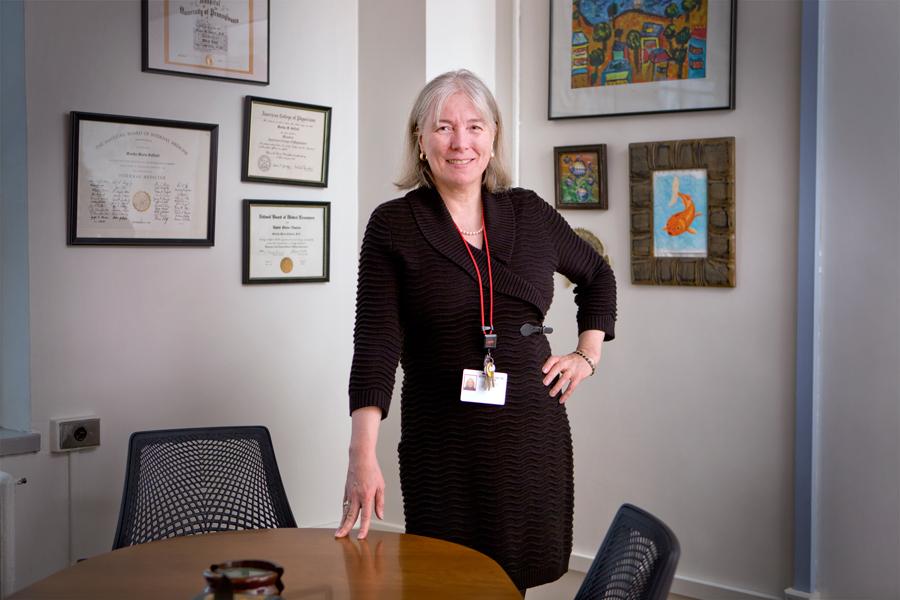Dr. Monika Safford, who was recruited to the Weill Department of Medicine in 2016 to serve as Chief of the Division of General Internal Medicine (GIM), is also the John J. Kuiper Professor of Medicine. Dr. John J. Kuiper, a Cornell alum, had funded the named professorship and then passed away soon after in 2015. His hope for a new and robust Division of GIM that would provide outstanding medical care to all patient populations has come to life under the leadership of Dr. Safford.
The many major advances since Dr. Safford’s arrival to Weill Cornell have included the merging of hospital medicine and ambulatory care within the division; the establishment of NIH-sponsored studies on health disparities; and the birth of Dr. Safford’s brainchild – the PALS. The PALS (Patient Activated Learning System) is an online source of knowledge for patients. It was envisioned by Dr. Safford when she was working at the University of Alabama at Birmingham School of Medicine (UAB) where she was carrying out numerous investigations involving an underserved and largely African-American region called the Alabama Black Belt, an area in which two-thirds of adults are obese and many have diabetes or hypertension. Dr. Safford’s goal for the PALS was that it would open the doors – for all patients - to a world of accessible, reliable, easily understood, and carefully researched medical information. Since joining Weill Cornell, she has been collaborating on the PALS with Dr. Fred N. Pelzman, an Associate Professor of Clinical Medicine in the Division of GIM and the Medical Director of Cornell Internal Medicine Associates. The Founder of the Institute for Primary Care Innovations at Weill Cornell, Dr. Pelzman incorporated the PALS under the Institute’s umbrella, and along with a talented low-cost software group that Dr. Safford had brought onboard from Alabama, the project reached fruition.
In March of 2017, the PALS premiered online with its first round of medical information focused on hypertension – the silent killer. “So many aspects of the PALS came together fortuitously,” explains Dr. Safford. “Now we have begun collaborating with the Division of Geriatrics and Palliative Medicine for our next round of medical information, which will be on palliative medicine. The PALS is an ongoing work in progress that will provide patients with knowledge in virtually all areas of medicine. It will help to improve a patient’s understanding of their own medical condition and, at the same time, enable shared decision-making between doctor and patient. There is limited time in the office when you are with a patient, and PALS is designed to help overcome that obstacle by building trust through knowledge.”
A large component of the PALS project is the culmination of many years of research conducted by Dr. Safford. This includes Dr. Safford’s experience treating low literacy populations, as well as her observations working in private practice with higher literacy populations. “Deficits in medical knowledge can be seen across all social strata, and what I have learned working on the PALS has been interesting. For instance, we have found that whether patients have low literacy or hold a Ph.D., most will gravitate to a simpler style of audio-visual that engages them, versus heavy text reading. It’s simply easier for them to understand, less mental energy is needed, and it’s less time-consuming. Whatever the social strata, patients share many similar concerns. What are the side effects of a medicine? How much will the medicine cost? How will it really help me? What are my risks and benefits?”
Dr. Safford is happy to report that the medical information on the PALS is not only available for patients at Weill Cornell, but it serves as an online platform of knowledge “for the whole world to use.”
“It is a pleasure to work with such a diverse and creative staff and to foster collaborations among the many talented physicians and scientists in our division,” says Dr. Safford. Dr. Safford is also forging outside collaborations, including a strategic retreat to be held at Cornell University that will produce a plan for the launch of a new research center devoted to health equity. It will be a unique collaboration between physician-investigators at Weill Cornell and top tier social scientists working at the Cornell University-Ithaca campus. This is one of several groundbreaking endeavors underway in the division. As Dr. Safford emphasizes, “Our ultimate goal is to become the best Division of GIM in the country within five years.”
(Please refer to Division Profiles for further information about activities in the Division of General Internal Medicine.)
Related Links
Doing TR Episode 16: "There is No Health System" with Dr. Monika Safford
BCTR Talks at Twelve: "Dr. Monika Safford: Health Equity in the 21st Century"


